NKENNE African Historical Series: Yaa Asantewaa
by Vennisa Owusu-Barfi
Source:obaasema.com
Black Panther, the billion-dollar grossing movie, was the first large-scale attempt to share African stories to a global audience. Its success demonstrated the need and growing market of consumers interested in stories from communities in non-Western cultures. Here at NKENNE, we’re going to launch a blog series exploring important historical figures across the continent. In this article, we’ll explore the life of Yaa Asantewaa.
Background
As a queen mother in the 19th Century Asante Empire, Yaa Asantewaa’s rise to the forefront of the century-long conflict between her people and the British Empire was a rather unusual tale. Though most of her life proved uneventful in comparison, she quickly rose through the ranks from a life of farming to the queen mother of Ejisu, a town in the empire, and a guardian of the Golden Stool. The Golden Stool symbolizes Asante unity, culture and power and thus, she played an important role in governance in the empire.
Image: The Golden Stool
Source: blackpast.org
Conflict
With the spread of British colonization across the West African continent, the Asante sphere of influence across the region began to diminish. A series of conflicts erupted between the Empire and the British culminating in the exile of the Asantehene Prempeh I and various chiefs, including her grandson Kofi Tene, to the Seychelles Islands.
When the British demanded the Golden Stool, a political tactic to demoralize Asante resistance to colonization, she rallied support among remaining chiefs to lead a final push. In words immortalized in folklore, she proclaimed that if the men of the kingdom would not defend the people, then the women would rise to the challenge; a statement which spurred the remaining chiefs to action.
Image: Yaa Asantewaa (c.1890s)
Source: blackpast.org
Remembrance
Unfortunately, this marked the final Anglo-Ashanti war and led to her capture and exile to the Seychelles Islands where she died in 1921. It cemented her however into one of the most important figures in Asante history. This final battle is now remembered as the Yaa Asantewaa War of Independence and she remains an icon in colonial resistance and female empowerment in Ghana.
Yaa Asantewaa Appellation Song in Asante Twi:
Koo koo hin koo
Yaa Asantewaa ee!
Obaa basia ogyina apremo ano ee!
Waye be egyae
Na Wabo mmode
Koo koo hin koo
Yaa Asantewaa
The woman who fights before cannons
You have accomplished great things.
Sources:
BBC. (n.d.). Yaa Asantewaa and the fight for the Golden Stool. BBC News. Retrieved August 7, 2022, from https://www.bbc.com/news/av/world-africa-44772345
West, contributed by: R. (2019, October 10). Yaa Asantewaa (mid-1800s-1921) •. •. Retrieved August 7, 2022, from https://www.blackpast.org/global-african-history/yaa-asantewaa-mid-1800s-1921/


